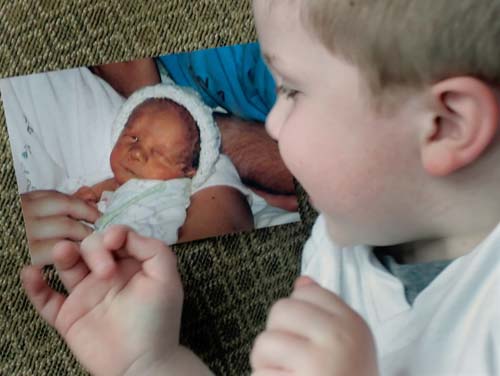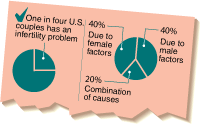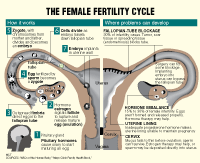 MCT
MCT
Article
Hundreds of women endure shame because of pregnancy loss or not being able to carry a pregnancy to full term. Here are plain facts about miscarriage and how you can prepare your body physically to avoid some of the health pitfalls that bring about pregnancy loss.
Learn the why behind the headlines.
Subscribe to the Real Truth for FREE news and analysis.
Subscribe NowA tiny mobile hangs above an empty snow-white crib covered in pink baby blankets. Nearby, a stuffed bear sits on a shelf above a wooden changing table with diapers already stacked ceiling high. Twilight filters in through a cracked window, announcing the end of the day.
It is time to put the baby to bed.
But unlike millions of other households—whose parents will have the opportunity to gently lull their little one to sleep in a rocking chair—in this household there will be no sweet face to tuck under the blankets, no bedtime stories to read, no hugs to receive, no warm body to hold, and no cries to awake the new parents in the middle of the night. The room will sit motionless, empty—a mere preparation made in expectation of a child who never arrived.
The couple—once excited, but now in anguish—will slowly go to bed, walking with longing past the nursery.
For 25% of couples, their dream of bearing a child can easily turn into an emotional nightmare. After learning they are pregnant, 25% of women have a first trimester pregnancy loss. Generally, after a miscarriage, a woman is able to have several healthy children.
But for another 15%, it can lead to disappointment upon finding out they are unable to carry a child to full term. All the preparation and excitement become a thing of the past. What the couple may have been planning for since their wedding day—the possibility of a houseful of several happy, bright-eyed children—becomes a distant dream.
The couple is left with a decision: (A) Try again, which can include extensive doctor visits, fertility drugs, scheduled sexual relations, close monitoring of the woman’s cycle, various blood tests to determine if either party has any type of infection, a dilation and curettage procedure, taking the man’s sperm count, any variety of medical surgeries and examining options such as in vitro fertilization. Or (B) live without bearing their own children.
Many couples choose the former, seeking at all costs to have their own baby—which, after spending thousands of dollars and years of trying without success, can set them up for even greater disappointment later, especially if the couple discovers they are infertile.
After consistently trying for one year to get pregnant, but to no avail, the couple feels like a failure, with some feeling they have been denied their God-given role to become parents.
But as statistics show, one miscarriage does not necessarily mean the couple will be completely infertile. The flipside of the 15% statistic is that 85% will bear children without any complications.
But what exactly does miscarriage mean for the thousands of women who have one? Before becoming overly discouraged, it is important to get the facts on the reasons behind miscarriages and what a couple can do to physically prepare for a healthy baby.
Reason Behind Pregnancy Loss
Pregnancy loss, or “spontaneous abortion,” normally occurs between the first and fourth month, or before the 20th week of pregnancy. After the 20th week, failed pregnancies are called “preterm deliveries.”
For most women, miscarriages can result from structural abnormalities in the fertilized egg, meaning that either the egg or sperm does not have a correct number of chromosomes, causing the fertilized egg to develop incorrectly. Other causes include the egg not being able to plant correctly in the uterus.
Harvey J. Kliman, M.D., Ph.D., Research Scientist of the Yale School of Medicine Department of Obstetrics, Gynecology and Reproductive Sciences, said there are four main causes for not being able to become pregnant: low egg quality, low sperm quality, low embryo quality, and failed implantation.
Failed implantation results if the woman’s uterus is unable to support growing a baby, often due to ill health or a variety of endocrinological malfunctions.
Dr. Kliman, who has worked with hundreds of women, patented and developed the Endometrial Function Test, which demonstrates the ability of a woman’s uterus to support implantation.
“An embryo is like a plant,” he said. “Therefore, for it to grow, it needs to be put into healthy soil and the soil is the lining of uterus.” He said his test is mainly effective for women considering in vitro fertilization, after all other aspects of the pregnancy have been analyzed.
 MCT; Understanding Fertility Problems
MCT; Understanding Fertility ProblemsOften women suffer from other genetic complications that do not allow them to get pregnant including the onset of perimenopause, stress, endometriosis, damaged fallopian tubes, and hydrosalpinx, an infection that causes the fallopian tubes to leak fluid, which could be toxic to a newly implanted embryo.
Men who are infertile can suffer from problems such as low sperm count, sometimes caused by unhealthy lifestyle decisions or a variety of genetic disorders, which can affect testicular functioning.
The University of Maryland Medical Center also revealed that in men, “deficiencies in certain nutrients, such as vitamin E, vitamin C, selenium, zinc, and folate, may be particular risk factors for infertility.”
In addition, Dr. Kliman said a woman’s weight could play a role in her inability to get pregnant. In a society where thinness is brought to an extreme, with women valuing their figure above all else, Dr. Kliman said another problem women struggle with is trying to get pregnant while being grossly underweight. In such cases, he will flatly inform women they will be unable to support a pregnancy until they gain weight. On the other hand, women who are overweight are more likely to experience complications during pregnancies.

Sometimes women miscarry and do not even know it. These are called “chemical pregnancies,” a clinical term for a very early miscarriage, in which a baby’s heartbeat is not yet detectable.
According to the American Pregnancy Association (APA), these may “account for 50% to 75% of all miscarriages. This occurs when a pregnancy is lost shortly after implantation, resulting in bleeding that occurs around the time of her expected period. The woman may not realize that she conceived when she experiences a chemical pregnancy.”
Regardless of a couples’ health status, experts agree that a miscarriage is less likely if a couple is generally healthy and seeks immediate prenatal care after engaging in sexual relations with the aim of pregnancy.
Coping With a Miscarriage
Once a miscarriage occurs, the effects are not only physically painful, but psychologically scarring. A woman can often take several weeks to a month to recover before trying again.
The APA said that, after losing a pregnancy, a woman may experience excessive vaginal bleeding or lower abdominal pain lasting up to two days after the miscarriage. She may also experience breast discomfort or leaking milk, or experience excessive bleeding, which results in infection.
Aside from the physical effects of a miscarriage, pregnancy loss can be emotionally devastating. Many have dreamed all their lives about becoming a mother—how they would raise their newborn baby and show pictures of him or her to friends and family. After a failed pregnancy, women suffer with the shame of what they perceive to be their own inadequacy as a woman, loving wife and life-giver. They can even become disillusioned with their very existence and feel something is wrong with them—that they were somehow created “incorrectly.” Most females feel it is unnatural for them to not be able to bear children!
Many women feel useless, worthless, empty, destitute and unworthy of their husbands, sentenced to a life of shame because they cannot fulfill the very purpose for which they were created. They blame themselves for everything they have done in life and question every decision they have ever made that could have negatively affected their bodies. They feel it is their fault and they are being punished for their past mistakes.
Often, it is not until a woman officially conceives that she is able to put this difficult time behind her—and even then, psychological damage continues to persist. Some find themselves wondering: If the baby had been born, what would he or she have been like? Would she have had my features or my husband’s? Would he have grown up to be a successful businessman or a firefighter? These questions sometimes haunt women several years after suffering a miscarriage.
Dr. Kliman recalled one couple he treated, who tried eight times to get pregnant without success.
“A lot of women feel their body has failed them,” he said. “It does have a big impact on women and their self esteem. But they still sort of suffer alone in this regards. They don’t necessarily communicate with other people about this.”
However, given that approximately 900,000 to one million U.S. pregnancies out of 4.4 million per year—about 25%—end in miscarriage, women need not feel alone in this regard.
Dr. Kliman said while women mostly bear the brunt of the blame, the problem is half as much the man’s fault as it is the woman’s. “Forty percent are the woman, forty percent are the man and 20 are both,” he said.
But even though a couple may be able to get pregnant after just one miscarriage, coping with a pregnancy loss is not always easy. Often, a healthcare provider can only provide so much information and comfort.
Out of the hundreds of women Dr. Kliman has advised, he said those women with the strongest support system (including a loving husband, family members and friends) often have the highest ability to cope psychologically.
However, he agrees that it is more based on the woman’s individual strength.
“I would say it’s much more related to simply the characteristics of the patient,” he said, “Certain women have stronger constitutions and deal with life in general, adversity and in a way that they are able to get through it better.”
Begin Preparing Now
According to pregnancy experts, one of the worst moves that a couple can make is to begin preparing too late—or ignore the warning signs of a failed pregnancy.
“When a mother’s body is having difficulty sustaining a pregnancy, signs (such as slight vaginal bleeding) may occur. This is a threatened abortion, which means there is a possibility of miscarriage, but it does not mean one will definitely occur. A pregnant woman who develops any signs or symptoms of threatened miscarriage should contact her prenatal provider immediately” (Healthline).
Other symptoms can include severe abdominal pain and pelvic cramps.
Most women do not take into account that certain lifestyle choices leading up to a pregnancy will affect them. These include whether they practice correct eating habits and live healthy lifestyles.
Dr. Kliman said that everything a woman has eaten, the things she has taken into her body, the air she has been exposed to, or her general state of health potentially affect her ability to give birth.
“There are two things that women can do,” he said. “Have children as early as you can and just live a healthy life in terms of eating well, take vitamins, [eat] fruits, vegetables, [and] antioxidants.”
Dr. Kliman also recommends not smoking, not drinking too much alcohol, not using drugs, and not being too overweight or too underweight. He also said that minimizing stress is crucial to a healthy pregnancy. He has often seen women and couples focused on becoming pregnant feel so much stress that they are unable to conceive; but once the couple has stopped routinely trying, they are able to get pregnant more easily.
In addition, he recommends that women begin taking folic acid as early as possible. “Taking folic acid is one of the most important things to prevent neural tube defects,” he said.
Unlike men, he added, who can have children until their 80s, women’s ability to bear children peaks between ages 20 to 25, and begins to drop when a woman enters her 30s. By the time a woman is 40, Dr. Kliman says, she only has a 10% chance of having children.
“The clock for women is a very ruthless, unforgiving clock.”
Although a miscarriage can be discouraging, a couple should take comfort that just one failed pregnancy does not necessarily equal being unable to bear children.
There are steps both parties can take to improve their chances of giving birth to a healthy baby—including making smart lifestyle choices now.
To understand more, read our booklet God’s Principles of Healthful Living.
More on Related Topics:
- Afghan Hunger Crisis Deepens as Aid Funding Falls Short, UN Says
- Israel’s Longest War Is Leaving a Trail of Traumatized Soldiers, With Suicides Also on the Rise
- Maintaining Your Health as You Grow Older
- The Blind to See—Humanity’s Fight to Cure Blindness
- ‘Nightmare Bacteria’ Cases Are Increasing in the U.S.



